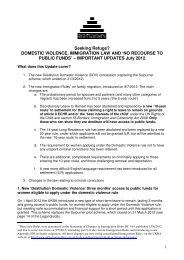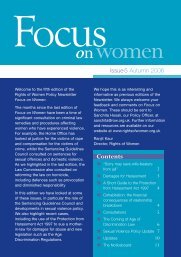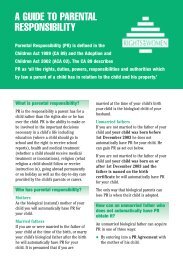Seeking Refuge? - Rights of Women
Seeking Refuge? - Rights of Women
Seeking Refuge? - Rights of Women
You also want an ePaper? Increase the reach of your titles
YUMPU automatically turns print PDFs into web optimized ePapers that Google loves.
Case-owners have a number <strong>of</strong> responsibilities<br />
including:<br />
- Meeting you at the first reporting event (see<br />
above).<br />
- Being responsible for any reporting<br />
conditions that are imposed on you.<br />
- Conducting your asylum interview.<br />
- Working with your legal representative to<br />
clarify the issues in the case.<br />
- Controlling the progression <strong>of</strong> your case by<br />
altering the times that certain things are<br />
done (for example, the date <strong>of</strong> the<br />
interview), if flexibility is required.<br />
- Making an initial decision on whether you<br />
should be granted protection in the UK or<br />
whether your claim should be refused.<br />
- Ending your case by either assisting you with<br />
your integration in the UK or arranging for<br />
your re-documentation and removal.<br />
Your legal representative (or you, if you don’t<br />
have a legal representative) should be in close<br />
contact with your case-owner(s) throughout<br />
the process.<br />
Why is my case in the Detained<br />
Fast-track?<br />
It is UK Border Agency policy that any asylum<br />
claim may be considered suitable for the detained<br />
fast-track where it appears, after screening, to be<br />
one where a quick decision may be made.<br />
The policy referred to is the Detained<br />
fast-track and detained non-suspensive<br />
appeals – intake selection (21/07/08). You<br />
can download a copy from the UK Border<br />
Agency website at:<br />
www.ind.home<strong>of</strong>fice.gov.uk/sitecontent/<br />
documents/policyandlaw/asylumprocess<br />
guidance/detention/<br />
The decision to deal with a case in the detained<br />
fast-track is taken on a case-by-case basis. There<br />
are some people who should not be detained:<br />
• <strong>Women</strong> who are 24 or more weeks pregnant.<br />
• Unaccompanied asylum-seeking children,<br />
whose dates <strong>of</strong> birth are accepted by the UK<br />
Border Agency.<br />
• Those with a medical condition requiring care<br />
24 hours a day.<br />
• Those with physical and / or learning disabilities<br />
requiring care 24 hours a day.<br />
• Those with a disability, except disabilities that<br />
can be managed easily.<br />
• Those with serious mental health problems,<br />
such as schizophrenia, who require treatment<br />
in a hospital.<br />
• Those with an infectious or contagious disease,<br />
such as TB, which cannot be managed in a<br />
detention centre.<br />
• Those who have independent evidence from an<br />
expert organisation (such as the Poppy Project)<br />
that they have been a victim <strong>of</strong> trafficking (that<br />
they have been brought into the UK and forced<br />
into prostitution).<br />
• Those who have independent evidence (from a<br />
doctor, for example) that they have been<br />
tortured. Torture is serious physical or mental<br />
harm. Torture includes beating someone, or<br />
harming them physically in other ways. Rape<br />
and other types <strong>of</strong> serious sexual violence are<br />
considered to be torture.<br />
If you are in one <strong>of</strong> these groups, you must tell<br />
your case-owner and your legal representative as<br />
soon as possible. Your legal representative can<br />
then take steps to try to have you released from<br />
detention.<br />
If you are not in one <strong>of</strong> the above groups, you can<br />
be considered for detention if your case could be<br />
decided quickly.<br />
According to UK Border Agency policy, most<br />
claims for asylum can be decided quickly, unless<br />
there is evidence indicating otherwise. Evidence<br />
which may show that a quick decision is not likely<br />
includes:<br />
• Where it appears that either you or the UK<br />
Border Agency will need to make further<br />
enquiries, or obtain evidence that would<br />
support your case, and it appears that this will<br />
take longer than the time allowed under the<br />
detained fast-track. Further enquiries could<br />
involve things such as getting a medical report<br />
or researching the situation in your country.<br />
• Where it is likely that documents that you have<br />
27
















